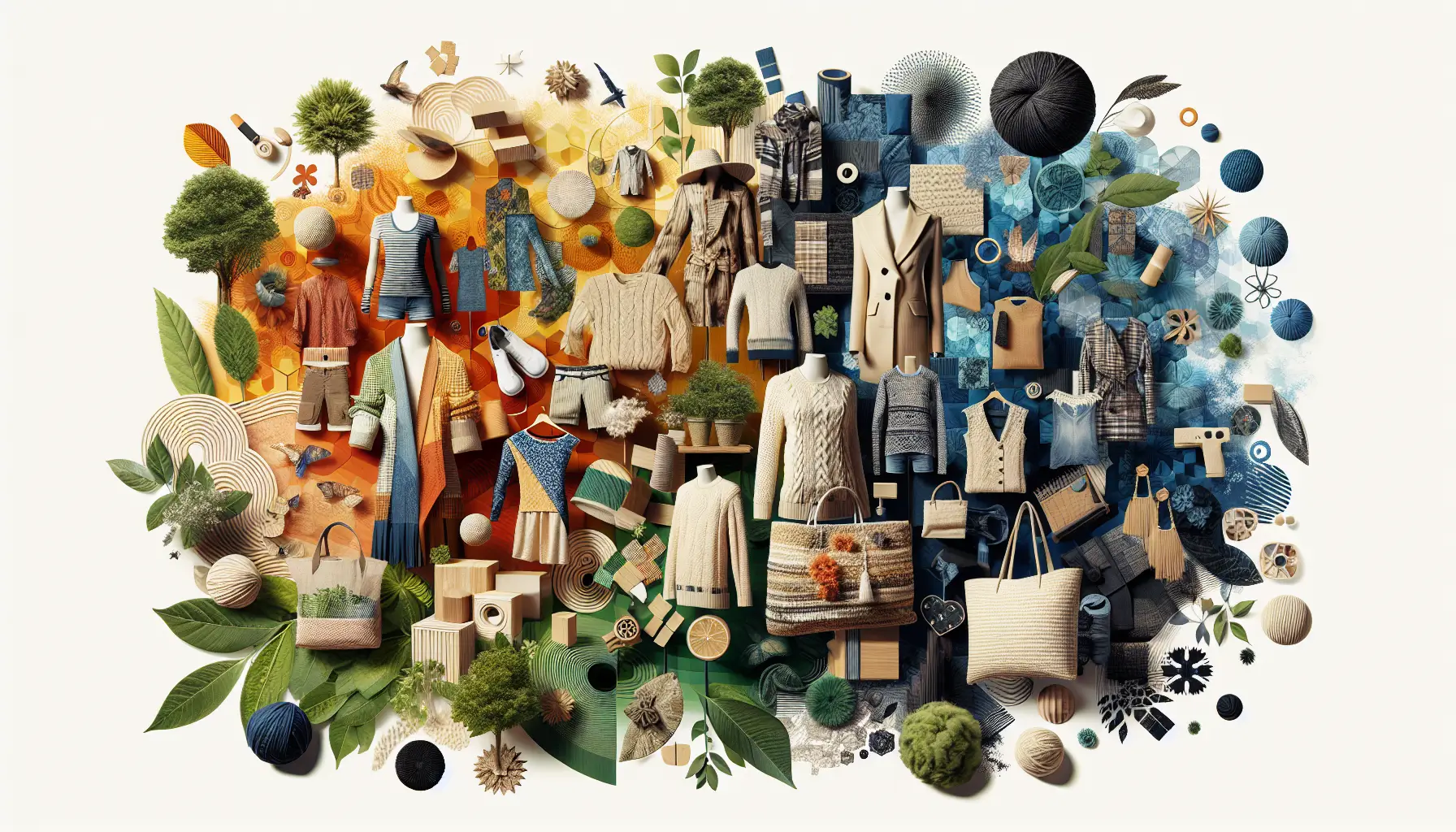Keep Ahead of the Contour by Discovering Cutting-edge Fashion Fads
In a market as vibrant as style, staying ahead involves greater than simply following current trends-- it requires an exploration of advancement. Smart textiles, for example, are changing garments right into practical work of arts, while 3D printing is changing layout processes with its customizable, waste-reducing capacities. As sustainability comes to be a cornerstone, developments like environmentally friendly materials and round fashion practices are improving environmental duty - Cape Town Sustainable Fashion. Moreover, the convergence of technology and style declares a new period of consumer involvement. Just how, then, can these arising patterns redefine the future of style, and what ramifications do they hold for brands looking for to flourish in this evolving landscape?

Accepting Smart Textiles
Recently, the apparel industry has experienced a transformative change with the integration of smart textiles, a cutting-edge advancement that blends technology with fabric. This development represents not only a combination of appearances and functionality but also a significant leap towards sustainability and customization in style. Smart fabrics, additionally called e-textiles, installed innovative electronic devices such as sensing units and conductive threads within the fabric, enabling garments to interact with the wearer or the setting.
These fabrics are developed to monitor physical criteria, such as heart price or body temperature, offering real-time health analytics. Past wellness applications, wise fabrics are additionally being made use of for flexible garments, which can change color or pattern in feedback to ecological stimuli, hence using a dynamic fashion experience.
In addition, the growth of energy-harvesting textiles that generate power from activity or sunshine is leading the method for self-sufficient wearable modern technology. This advancement is appealing to eco mindful consumers and designers aiming to minimize the environmental impact of fashion. As r & d in this field advancement, smart fabrics are expected to come to be progressively prevalent, improving the landscape of modern style with their multifunctional abilities.
The Rise of 3D Printing
Revolutionizing the production landscape, 3D printing has become a game-changer in the garment industry. This sophisticated innovation has enabled designers to press the limits of creative thinking, creating detailed and customized garments that were formerly unthinkable. By leveraging digital style and additive production, 3D printing helps with the production of complex geometries and patterns, enabling developers to experiment with brand-new structures and frameworks.
A notable advantage of 3D printing in style is its capacity to produce on-demand, lessening waste and lowering supply needs. This efficiency not just maximizes production processes however likewise permits for quick prototyping, allowing developers to bring their visions to life in a much shorter duration. Moreover, 3D printing supports customization to a degree unrivaled by standard approaches, supplying unique styles and individualized fits customized to private customer choices.
The increase of 3D printing has actually likewise democratized fashion, making it available to emerging designers who can now fabricate top quality pieces without significant economic investment in typical production framework. As modern technology proceeds to breakthrough, the style market is positioned to harness the complete possibility of 3D printing, discovering new materials and techniques that will unquestionably redefine how fashion is conceived and produced.
Sustainable Style Advancements
As the fashion industry grapples with journalism requirement for ecological duty, lasting fashion innovations have actually emerged at the forefront of transformative adjustment. The expanding awareness of eco-friendly effect has sustained a shift towards even more eco-conscious methods and materials. Brand names and designers are currently prioritizing sustainability, including techniques that reduce waste and reduce carbon impacts.
One substantial development is the increase of round style, which highlights recycling and upcycling to expand the lifecycle of garments. This technique not just reduces waste but likewise urges customers to embrace an extra conscious method to clothes intake.
An additional breakthrough exists in the adoption of cutting-edge dyeing strategies that use natural dyes or waterless procedures, thus minimizing the vast amounts of water and chemicals traditionally used in textile dyeing. Additionally, developments in biotechnology have actually resulted in the creation of lab-grown natural leather and textiles, providing environmentally friendly and cruelty-free alternatives to traditional products. Via these introducing initiatives, the fashion business is making view website meaningful strides towards a more lasting future.

Tech-Integrated Clothing
Tech-integrated apparel stands for a cutting-edge combination of fashion and modern technology, improving how people engage with their clothes. This innovative domain name is marked by the incorporation of wise textiles and ingrained digital parts, improving both functionality and visual appeal. From health and fitness trackers installed in sportswear to heated coats managed through smart device apps, tech-integrated garments provides customers unmatched ease and versatility.
Pioneering brands are driving this trend, focusing on developing garments that reply to ecological stimulations or customer commands. For instance, some garments can change color or pattern in action to temperature level shifts, while others incorporate biometric sensors to monitor wellness metrics like heart rate or stress and anxiety degrees. The smooth assimilation of innovation right into fabrics additionally includes ecological sustainability, with initiatives to create self-cleaning fabrics or garments that readjust to weather problems, therefore lessening the requirement for multiple layers.
Moreover, the introduction of wearable technology is not just restricted to garments however expands to devices like watches and eyewear, additional widening the extent of tech-integrated fashion. As the market remains to innovate, the possibility for customization and personalization in apparel expands, supplying consumers special, tech-enhanced style experiences that accommodate their individual demands and preferences.
Future of Virtual Style
In the last few years, the future of digital style has become a transformative force within the sector, leveraging developments in digital modern technology to redefine how style is created, experienced, and eaten. By incorporating augmented truth (AR), virtual truth a fantastic read (VIRTUAL REALITY), and 3D design devices, developers can now craft interactive and immersive experiences that go beyond traditional fashion borders. Digital fashion enables the creation of garments that exist exclusively in electronic settings, offering limitless opportunities for development without the restrictions of physical production.
This digital change not just presents chances for imaginative expression yet also addresses sustainability issues inherent in conventional fashion techniques. Cape Town Sustainable Fashion. By removing the need for physical resources, online style minimizes waste and decreases carbon footprints. Additionally, the increase of online style straightens with the raising click here to find out more consumer demand for distinct and individualized experiences, as digital garments can be customized and tailored to individual preferences easily

Conclusion
The apparel industry's future hinge on the combination of lasting practices and cutting-edge technologies - Cape Town Sustainable Fashion. Smart fabrics and tech-integrated apparel are boosting capability, while 3D printing supplies chances for modification and waste reduction. Lasting fashion, with environment-friendly materials and circular strategies, demonstrates a commitment to ecological stewardship. Furthermore, online style is poised to redefine consumer communications. Adapting to these fads is essential for brand names looking for to remain competitive and pertinent in this swiftly evolving landscape.
In recent years, the fashion industry has seen a transformative shift with the assimilation of clever fabrics, an advanced advancement that mixes modern technology with textile.As the style sector grapples with the pushing requirement for ecological duty, lasting style advancements have actually arised at the leading edge of transformative modification.In recent years, the future of online style has actually arised as a transformative pressure within the market, leveraging improvements in digital innovation to redefine exactly how fashion is created, experienced, and consumed. The surge of digital style straightens with the raising customer demand for customized and distinct experiences, as virtual garments can be tailored and customized to private preferences with ease.
The style market's future lies in the combination of innovative technologies and lasting methods.